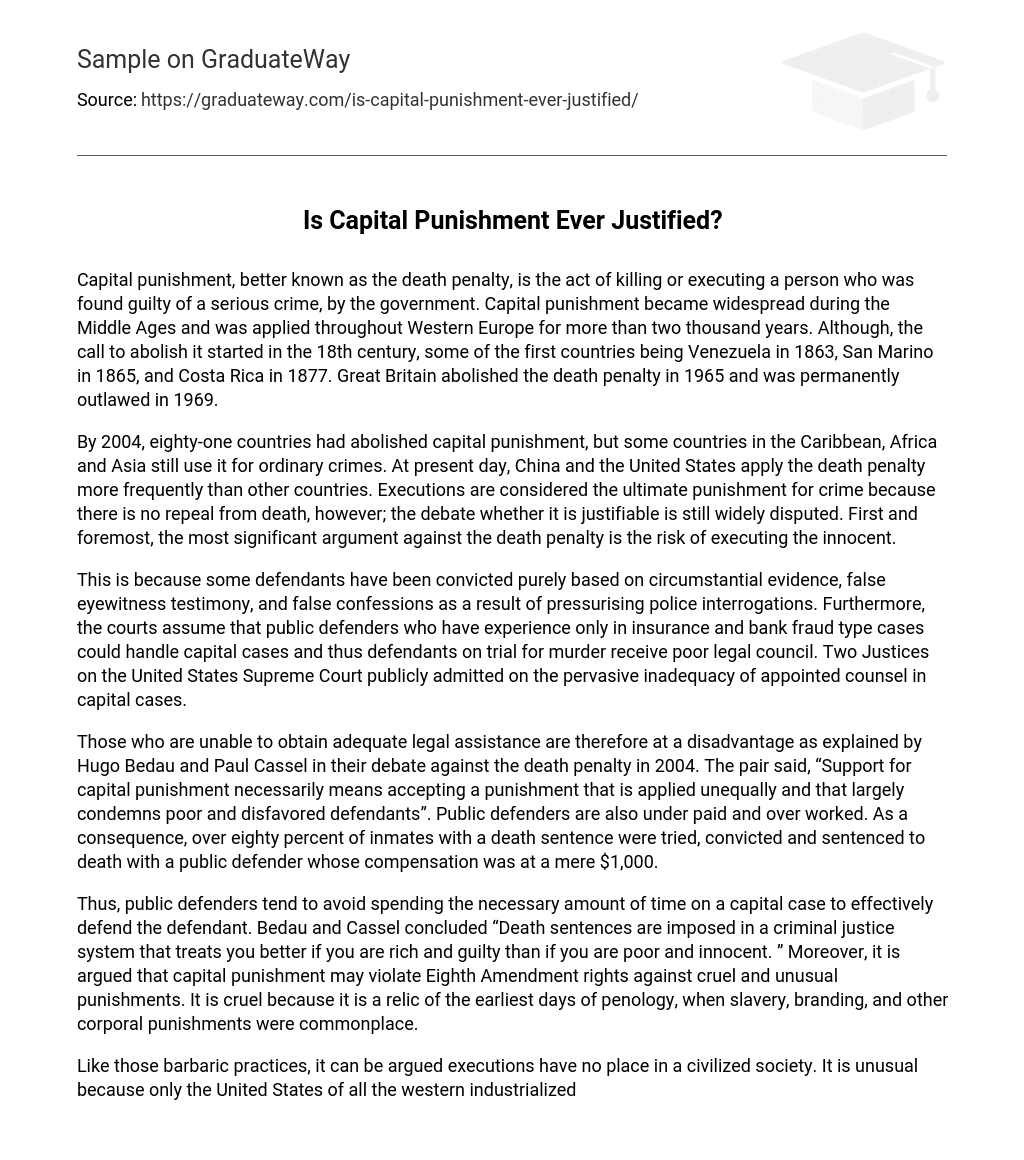The death penalty, also known as capital punishment, has been carried out by governments for centuries in Western Europe during the Middle Ages. However, efforts to eliminate this practice began in the 18th century. Venezuela initiated abolition in 1863, followed by San Marino in 1865 and Costa Rica in 1877. Ultimately, Great Britain abolished capital punishment in 1965 and officially banned it in 1969.
By 2004, the death penalty had been abolished in eighty-one countries. However, certain Caribbean, African, and Asian nations still utilize it for ordinary crimes. China and the United States are the primary countries that practice capital punishment. Executions are considered the ultimate form of punishment because they cannot be undone; however, there is an ongoing debate about whether it is justified. The main argument against capital punishment focuses on the possibility of mistakenly executing innocent people.
The reason for this is that certain defendants have been found guilty solely based on circumstantial evidence, unreliable eyewitness testimony, and coerced false confessions during police interrogations. Additionally, the courts assign public defenders who primarily specialize in insurance and bank fraud cases to handle capital cases, resulting in murder defendants receiving insufficient legal representation. Two Justices of the United States Supreme Court openly acknowledged the extensive deficiency of appointed counsel in capital cases.
Hugo Bedau and Paul Cassel contend in their 2004 debate that the death penalty puts individuals without proper legal aid at a disadvantage. They argue that supporting capital punishment leads to an unequal punishment that particularly affects impoverished and marginalized defendants. Moreover, public defenders face the challenges of low pay and excessive workload. Consequently, more than 80% of death row inmates were represented by public defenders who received a mere $1,000 for their services.
In their argument, Bedau and Cassel contend that public defenders in capital cases frequently fail to dedicate enough time to properly defend defendants. They propose that the criminal justice system has a tendency to favor wealthier and guilty individuals at the expense of poorer and innocent ones when imposing death sentences. Moreover, there is an ongoing dispute regarding the potential violation of Eighth Amendment rights by capital punishment. These rights are meant to safeguard against cruel and unusual punishments, with concerns arising from its historical roots in a period marked by pervasive slavery, branding, and other forms of corporal punishment which inherently embody cruelty.
Executing individuals is akin to primitive practices in a cultured community. Among Western nations, solely the United States upholds this type of penalty, rendering it uncommon. Besides, only specific categories of convicted killers in America are subjected to capital punishment. Moreover, there exist numerous ethical objections to the death penalty, with abolitionists stressing the significance and respect for human life.
Although there are individuals who oppose the government’s authority to impose capital punishment on the grounds that it fails to sufficiently acknowledge the seriousness of the offense, others see it as a disrespectful infringement upon human dignity and a violation of the fundamental right to life. Nonetheless, there are also advocates in favor of the death penalty. According to a 2010 survey evaluating the legitimacy of this practice, sixty-five percent of Americans indicated their endorsement.
There is an ongoing discussion surrounding the effectiveness of the death penalty in deterring serious crimes. While certain individuals argue that it dissuades potential offenders, there is insufficient proof to indicate a decrease in homicide rates when capital punishment is applied. As a result, uncertainty remains regarding the extent to which the death penalty deters individuals from committing murder. In 2004, Bedau and Cassel proposed a hypothetical scenario involving immediate lightning strikes for those who intentionally kill innocent individuals.
The notion that capital punishment would effectively discourage murderers is nothing more than wishful thinking. Furthermore, retribution advocates for the death penalty by asserting that individuals who intentionally take the lives of others deserve to be executed. Bedau and Cassel contend that “Deliberately ending the life of an innocent individual is so abhorrent that, unless there are mitigating circumstances, the perpetrator relinquishes their own entitlement to life.” Retribution distinguishes itself from revenge by advocating for proportionate punishment based on the gravity of the murderer’s offense.
Moreover, studies indicate that implementing the death penalty has the potential to deter convicted murderers from committing more crimes, thus safeguarding innocent lives. A recent investigation was carried out in the United States, analyzing 52,000 prison inmates serving sentences for murder. The findings were alarming: 810 individuals with previous murder convictions proceeded to commit an additional 821 homicides after their initial convictions. This indisputably demonstrates the possibility of repeat offenders engaging in further acts of killing. If these criminals had been executed following their first conviction, it is approximated that over 800 lives could have been preserved.





